This is the first book in the Belgariad (before Queen of Sorcery, Magician's Gambit, Castle of Wizardry, and Enchanter's End Game).
Garion is a 9-year-old boy living on Faldor's farm in Sendaria with his Aunt Pol. He likes spending time in the smithy watching Durnik work, and in the tavern listening to Old Wolf the storyteller's tales of ancient Gods and battles.
One day, when accompanying Wolf to the spice merchant in the town of Upper Gralt, he's questioned by a Murgo, who gives him an Angarak penny. Alarmed, Old Wolf brings him back to Faldor's farm and leaves.
Times goes by and the storyteller comes back five years later with such news that'll force Aunt Pol and Garion to flee Faldor's farm with him, taking reliable Durnik along. This is the beginning of a great adventure for Garion. Little by little he learns about his parents and his heritage. As they travel all across Sendaria, their party is joined by a huge red-haired Cherek called Barak, and a sly Drasnian thief called Silk who will teach him a secret sign language. Later, exposed by one of Sendarian King Fulrach's men, they'll sail to Val Alorn, the capital of Cherek, to participate in a council of kings.
This is one of the very first fantasy series I read, 11 years ago, and I remember loving it at the time. Having since then read many other fantasy books, but also a bunch of negative critics about the Eddings couple's work, I felt the need to try those again to make my own updated opinion and compare. And I must say I'm positively surprised! There may not be many descriptions, and the characters might be a little stereotyped, but the plot is really fast-paced and entertaining, and the world so vast I can't wait to explore it all again with Garion and Co.
Fast-paced and entertaining.
 Posted : 16 years, 8 months ago on 26 October 2008 07:23
(A review of Pawn of Prophecy (The Belgariad))
Posted : 16 years, 8 months ago on 26 October 2008 07:23
(A review of Pawn of Prophecy (The Belgariad)) 0 comments, Reply to this entry
0 comments, Reply to this entry
Chuckle double effect!
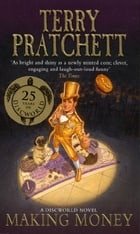 Posted : 16 years, 9 months ago on 1 October 2008 07:51
(A review of Making Money)
Posted : 16 years, 9 months ago on 1 October 2008 07:51
(A review of Making Money)Making Money is a Discworld novel and features the Man in the Golden Suit, Ankh-Morpork's Postmaster Moist von Lipwig.
Moist is bored. He misses his old, more adventurous life, back when he was Albert Spangler the con artist. So when he's not running the Post Office, he likes climbing to its roof at night, and has already picked all its locks.
But when Mrs Topsy Lavish, chairwoman and owner of 50% of the Royal Bank of Ankh-Morpork, but owner also of Mr. Fusspot the dog who owns 1%, dies and leaves her shares to her dog and bequeaths Mr. Fusspot to Moist... he has no choice but try and make it work again.
It starts with the Mint, which actually runs at a loss. Since making coins costs too much and people are already using stamps as currency, Moist devises the first bank notes, which soon have the same success as his stamps.
In the meantime, Cosmo Lavish tries to take Vetinari's identity and Moist's girlfriend Adora Belle Dearheart uncovers ancient golems buried in the desert. And all the while the Glooper gloops.
I really like the character of Moist von Lipwig and was glad to read about him again. The book is of course filled with references that make you chuckle twice: when you get them, and when you find yourself clever because to got them... it's the Discworld double effect!
Moist is bored. He misses his old, more adventurous life, back when he was Albert Spangler the con artist. So when he's not running the Post Office, he likes climbing to its roof at night, and has already picked all its locks.
But when Mrs Topsy Lavish, chairwoman and owner of 50% of the Royal Bank of Ankh-Morpork, but owner also of Mr. Fusspot the dog who owns 1%, dies and leaves her shares to her dog and bequeaths Mr. Fusspot to Moist... he has no choice but try and make it work again.
It starts with the Mint, which actually runs at a loss. Since making coins costs too much and people are already using stamps as currency, Moist devises the first bank notes, which soon have the same success as his stamps.
In the meantime, Cosmo Lavish tries to take Vetinari's identity and Moist's girlfriend Adora Belle Dearheart uncovers ancient golems buried in the desert. And all the while the Glooper gloops.
I really like the character of Moist von Lipwig and was glad to read about him again. The book is of course filled with references that make you chuckle twice: when you get them, and when you find yourself clever because to got them... it's the Discworld double effect!
 0 comments, Reply to this entry
0 comments, Reply to this entry
Lost in the forest
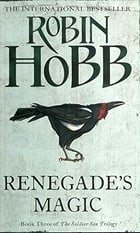 Posted : 16 years, 9 months ago on 17 September 2008 08:33
(A review of Renegade's Magic (The Soldier Son Trilogy, Book 3): Book Three of The Soldier Son Trilogy)
Posted : 16 years, 9 months ago on 17 September 2008 08:33
(A review of Renegade's Magic (The Soldier Son Trilogy, Book 3): Book Three of The Soldier Son Trilogy)This is the third and final volume in the Soldier Son trilogy (after Shaman's Crossing and Forest Mage).
Barely escaping Gettys and its angry mob with his life, Nevare flees into the forest. Realizing that the King's Road is planned to go right through the part where Lisana's tree stands, he makes one last attempt at stopping its construction with the Magic. Alas, it doesn't work as expected and Nevare's Magic is all be depleted.
Finding him in this poor condition, Olikea and her son Likari need to feed him again until he regains a respectable girth, so they can present him as Great One to their kin clan at the Wintering Place, on the other side of the Barrier Mountains.
As time passes and Nevare tries to find out what the Magic expects him to do, his Speck self, Soldier's Boy, becomes more and more powerful, until he finally takes control of his body. Nevare is then nothing but a helpless witness of Soldier's Boy's actions: when he tattoos his skin with the dapples of the Specks, or when he plans a raid on the Gernians in Gettys to stop their Eastward progression. Only on rare occasions can Nevare surreptitiously tap Soldier's Boy Magic and dream-walk to his cousin Epiny, to try and warn her of the impending attack.
A major part of the book takes place in the forest with the Specks, and even though I'm a tree-hugger, sadly I must admit that their culture failed to intrigue me. I felt close to Nevare but not to Soldier's Boy. Probably because the "Gernian-bred" me was taking sides, and I found myself constantly waiting for signs that things would look up for Nevare, that the scales would finally tip in his favour and reunite his split personality without too much loss and sacrifice. But that's also why I found the last third of the book tremendously exciting.
As a whole, the Soldier Son trilogy was a more than excellent series, and Robin Hobb's storytelling surpasses everything I have read. However, I still have a preference for her precedent trilogies (The Farseer, The Liveship Traders, and The Tawny Man). I do hope it grows on me with time, though. I'm sure it will.
Barely escaping Gettys and its angry mob with his life, Nevare flees into the forest. Realizing that the King's Road is planned to go right through the part where Lisana's tree stands, he makes one last attempt at stopping its construction with the Magic. Alas, it doesn't work as expected and Nevare's Magic is all be depleted.
Finding him in this poor condition, Olikea and her son Likari need to feed him again until he regains a respectable girth, so they can present him as Great One to their kin clan at the Wintering Place, on the other side of the Barrier Mountains.
As time passes and Nevare tries to find out what the Magic expects him to do, his Speck self, Soldier's Boy, becomes more and more powerful, until he finally takes control of his body. Nevare is then nothing but a helpless witness of Soldier's Boy's actions: when he tattoos his skin with the dapples of the Specks, or when he plans a raid on the Gernians in Gettys to stop their Eastward progression. Only on rare occasions can Nevare surreptitiously tap Soldier's Boy Magic and dream-walk to his cousin Epiny, to try and warn her of the impending attack.
A major part of the book takes place in the forest with the Specks, and even though I'm a tree-hugger, sadly I must admit that their culture failed to intrigue me. I felt close to Nevare but not to Soldier's Boy. Probably because the "Gernian-bred" me was taking sides, and I found myself constantly waiting for signs that things would look up for Nevare, that the scales would finally tip in his favour and reunite his split personality without too much loss and sacrifice. But that's also why I found the last third of the book tremendously exciting.
As a whole, the Soldier Son trilogy was a more than excellent series, and Robin Hobb's storytelling surpasses everything I have read. However, I still have a preference for her precedent trilogies (The Farseer, The Liveship Traders, and The Tawny Man). I do hope it grows on me with time, though. I'm sure it will.
 0 comments, Reply to this entry
0 comments, Reply to this entry
True to Robin Hobb's tradition.
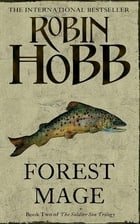 Posted : 16 years, 10 months ago on 20 August 2008 08:08
(A review of Forest Mage (The Soldier Son Trilogy, Book 2): Book Two of The Soldier Son Trilogy)
Posted : 16 years, 10 months ago on 20 August 2008 08:08
(A review of Forest Mage (The Soldier Son Trilogy, Book 2): Book Two of The Soldier Son Trilogy)This is the second volume is the Soldier Son trilogy (after Shaman's Crossing and before Renegade's Magic).
Recovering from the plague, many surviving cadets can now only hope for a fragile health. Nevare convalesces remarkably well though, but as time goes by, he realizes the Specks' magic is taking a much crueller toll on his imbued body.
Looking forward to travelling back home to Widevale for his brother's wedding, his joy will be short lived. Nevare is far from welcome. Indeed, his father blames him for his condition, and will do everything to set things as they should be. To no avail. When the plague comes again and decimates the region, Nevare has no choice but to leave.
Cast out, he makes his way eastwards, and spends some time in Dead Town. There he meets Amzil and her children, who'll become as close to friends as he's ever had in the last months. But as he helps her, her neighbours' jealousies start to threaten her life. He'll leave when his duty commands him to take the wounded scout Buel Hitch to Gettys.
Gettys is a fortified town at the base of the Barrier Mountains, the last one on the King's Road which is being built to reach the sea beyond the mountains. But upon arrival, Nevare rapidly notices that the city is a pale shadow of what he expected, that the command is a shambles, and that roadworks has all but stopped at the edge of the forest. Not only are felled giant trees blocking the way, but a strange spell of fear and despair has fallen over the inhabitants, preventing any progression of the construction.
Despite his crippling condition, Nevare manages to gets a post at the graveyard. In the nearby forest, he'll meet a Specks woman named Olikea, and will start to learn about her People.
True to her tradition, Robin Hobb deals her main character unjust fate after unfair hand. And as poor Nevare is really at a lost about what he should do about the Magic, his social situation only gets worse, he becomes the victim of wrongful decisions, biased reactions and finally, false accusations. All this is interwoven with lavish forest scenes betraying the author's love of trees and Nature, and exquisite descriptions of food that you can savour with Nevare. The ending is beautiful and very moving and I'm very impatient to read the third and final book.
Recovering from the plague, many surviving cadets can now only hope for a fragile health. Nevare convalesces remarkably well though, but as time goes by, he realizes the Specks' magic is taking a much crueller toll on his imbued body.
Looking forward to travelling back home to Widevale for his brother's wedding, his joy will be short lived. Nevare is far from welcome. Indeed, his father blames him for his condition, and will do everything to set things as they should be. To no avail. When the plague comes again and decimates the region, Nevare has no choice but to leave.
Cast out, he makes his way eastwards, and spends some time in Dead Town. There he meets Amzil and her children, who'll become as close to friends as he's ever had in the last months. But as he helps her, her neighbours' jealousies start to threaten her life. He'll leave when his duty commands him to take the wounded scout Buel Hitch to Gettys.
Gettys is a fortified town at the base of the Barrier Mountains, the last one on the King's Road which is being built to reach the sea beyond the mountains. But upon arrival, Nevare rapidly notices that the city is a pale shadow of what he expected, that the command is a shambles, and that roadworks has all but stopped at the edge of the forest. Not only are felled giant trees blocking the way, but a strange spell of fear and despair has fallen over the inhabitants, preventing any progression of the construction.
Despite his crippling condition, Nevare manages to gets a post at the graveyard. In the nearby forest, he'll meet a Specks woman named Olikea, and will start to learn about her People.
True to her tradition, Robin Hobb deals her main character unjust fate after unfair hand. And as poor Nevare is really at a lost about what he should do about the Magic, his social situation only gets worse, he becomes the victim of wrongful decisions, biased reactions and finally, false accusations. All this is interwoven with lavish forest scenes betraying the author's love of trees and Nature, and exquisite descriptions of food that you can savour with Nevare. The ending is beautiful and very moving and I'm very impatient to read the third and final book.
 0 comments, Reply to this entry
0 comments, Reply to this entry
An atypical setting but an absorbing novel.
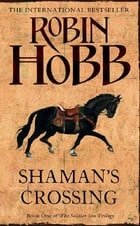 Posted : 16 years, 11 months ago on 29 July 2008 09:56
(A review of Shaman's Crossing (The Soldier Son Trilogy, Book 1): Book One of The Soldier Son Trilogy)
Posted : 16 years, 11 months ago on 29 July 2008 09:56
(A review of Shaman's Crossing (The Soldier Son Trilogy, Book 1): Book One of The Soldier Son Trilogy)This is the first volume in the Soldier Son trilogy (before Forest Mage and Renegade's Magic).
Starting in Widevale, far East on the shores of the Tefa river, the story is Nevare's account of his life. Born second son to Lord Burvelle, a former cavalla soldier promoted to nobility for good service rendered in the recent colonisation of the plains and the bringing of civilization to the native nomadic tribes, he is destined to become the soldier of the family.
To toughen him up, Nevare's father sends him to spend time in the desert with a Kidona warrior, Dewara, because he thinks there are some things that can only be learnt from an enemy. During his stay, Nevare experiences a trance in which Dewara asks him to kill whom he meets... but Nevare discovers an old and mysteriously powerful Tree Woman. Following his soldier's code of honour, he refuses to slay her. Barely escaping death, he is returned to his father with a scalp wound, and a latent magic bond that will plague his dreams.
When Nevare reaches eighteen, it is time to go to the capital, Old Thare, and the strictness of its Cavalla Academy. The thickest part of the book describes his life on the campus, making friends with his fellow students as well as enemies, enduring the pranks played on them by the older cadets, walking the demerits they earn, facing many an injustice... against a backdrop of political jealousies between Old and New Nobles.
At first I was a bit unsettled by the atypical setting (for a Fantasy novel), more "Civil War" than "Mediaeval", and I was afraid the retelling of the hero's school life would feel too much like Harry Potter... but as all those mishaps culminate, with Nevare the victim of unfair decision upon unfair decision (when you think nothing worse could possibly befall him, well you're on for another surprising twist), as further characters come into play and further pieces fall into place, the book becomes more and more absorbing. Again, Robin Hobb's extraordinary storytelling talent transports you to another world full of fascinating characters and enchanting sceneries.
Starting in Widevale, far East on the shores of the Tefa river, the story is Nevare's account of his life. Born second son to Lord Burvelle, a former cavalla soldier promoted to nobility for good service rendered in the recent colonisation of the plains and the bringing of civilization to the native nomadic tribes, he is destined to become the soldier of the family.
To toughen him up, Nevare's father sends him to spend time in the desert with a Kidona warrior, Dewara, because he thinks there are some things that can only be learnt from an enemy. During his stay, Nevare experiences a trance in which Dewara asks him to kill whom he meets... but Nevare discovers an old and mysteriously powerful Tree Woman. Following his soldier's code of honour, he refuses to slay her. Barely escaping death, he is returned to his father with a scalp wound, and a latent magic bond that will plague his dreams.
When Nevare reaches eighteen, it is time to go to the capital, Old Thare, and the strictness of its Cavalla Academy. The thickest part of the book describes his life on the campus, making friends with his fellow students as well as enemies, enduring the pranks played on them by the older cadets, walking the demerits they earn, facing many an injustice... against a backdrop of political jealousies between Old and New Nobles.
At first I was a bit unsettled by the atypical setting (for a Fantasy novel), more "Civil War" than "Mediaeval", and I was afraid the retelling of the hero's school life would feel too much like Harry Potter... but as all those mishaps culminate, with Nevare the victim of unfair decision upon unfair decision (when you think nothing worse could possibly befall him, well you're on for another surprising twist), as further characters come into play and further pieces fall into place, the book becomes more and more absorbing. Again, Robin Hobb's extraordinary storytelling talent transports you to another world full of fascinating characters and enchanting sceneries.
 0 comments, Reply to this entry
0 comments, Reply to this entry
Not for me.
 Posted : 17 years, 3 months ago on 11 March 2008 07:01
(A review of The Divine Comedy (Oxford World's Classics))
Posted : 17 years, 3 months ago on 11 March 2008 07:01
(A review of The Divine Comedy (Oxford World's Classics))Inferno is the first part of Dante Alighieri's Divine Comedy (before Purgatorio and Paradiso).
In this book, we follow Dante as he visits Hell, walking down its nine consecutive Circles accompanied by the poet Virgil, and meeting old acquaintances on the way.
This should not become a habit, but I intend to stop after the first volume and not finish the trilogy. First, I realize I'm simply not sensitive to poetry. Then, there are too many references to public or mythical figures of the Antiquity and 13th-century Florence, and I'm not sufficiently educated in History and Biblical Lore to enjoy this book.
Still, Sisson's modern English translation is good and reads easily. The notes at the end of the book are well-done and help understand what Dante is referring to, but I was too lazy to constantly check back and forth. I'm wondering if it would have been a better choice if they'd been placed in the margin.
In this book, we follow Dante as he visits Hell, walking down its nine consecutive Circles accompanied by the poet Virgil, and meeting old acquaintances on the way.
This should not become a habit, but I intend to stop after the first volume and not finish the trilogy. First, I realize I'm simply not sensitive to poetry. Then, there are too many references to public or mythical figures of the Antiquity and 13th-century Florence, and I'm not sufficiently educated in History and Biblical Lore to enjoy this book.
Still, Sisson's modern English translation is good and reads easily. The notes at the end of the book are well-done and help understand what Dante is referring to, but I was too lazy to constantly check back and forth. I'm wondering if it would have been a better choice if they'd been placed in the margin.
 0 comments, Reply to this entry
0 comments, Reply to this entry
A hymn to Nature and simplicity.
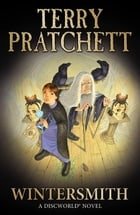 Posted : 17 years, 6 months ago on 27 December 2007 11:56
(A review of Wintersmith: (Discworld Novel 35) (Discworld Novels))
Posted : 17 years, 6 months ago on 27 December 2007 11:56
(A review of Wintersmith: (Discworld Novel 35) (Discworld Novels))This is the third book is the Tiffany Aching series (after The Wee Free Men and A Hat Full of Sky, and before When I Am Old I Shall Wear Midnight).
It's the beginning of a long, cold winter, and twelve-year-old Tiffany Aching has to save the lambs.
Tiffany's an apprentice at Miss Treason's, the very, very old (she's 113) and blind witch. She likes working there, helping around, even though she finds it slightly irritating when the witch borrows her eyes. There she also learns about the "Boffo".
One night in a clearing, they witness the Dark Morris and Tiffany's dragged into the dance. The Wintersmith falls in love with her, and starts making Tiffany-shaped snowflakes and icebergs. And he wants to become human, too. For sure the girl is flattered, but if she doesn't do something about it, winter will never end, springtime will never come again.
To cap it all, Miss Treason is about to die. She makes it spectacular though! And naturally now the young Lancre witches are competing for her cottage, and since Annagramma's the oldest, she's most likely to get it. The problem is, she thinks witching is about Magick, whereas it's more like settling quarrels between farmers and midwiving, really. Hopefully, Tiffany's here to help (but shh, don't tell the other witches).
Of course, the Feegles are always around to lend their big wee hag a hand.
True to the Tiffany Aching books tradition, this third volume is a perfectly balanced mix between the funny (the Nac Mc Feegle's appearances for example, or Horace the cheese) but also real-world-relevant sides of Discworld, and a more bucolic, pastoral, romantic and nostalgic hymn to Nature and simplicity. Have I said I really really love the Tiffany Aching books?
It's the beginning of a long, cold winter, and twelve-year-old Tiffany Aching has to save the lambs.
Tiffany's an apprentice at Miss Treason's, the very, very old (she's 113) and blind witch. She likes working there, helping around, even though she finds it slightly irritating when the witch borrows her eyes. There she also learns about the "Boffo".
One night in a clearing, they witness the Dark Morris and Tiffany's dragged into the dance. The Wintersmith falls in love with her, and starts making Tiffany-shaped snowflakes and icebergs. And he wants to become human, too. For sure the girl is flattered, but if she doesn't do something about it, winter will never end, springtime will never come again.
To cap it all, Miss Treason is about to die. She makes it spectacular though! And naturally now the young Lancre witches are competing for her cottage, and since Annagramma's the oldest, she's most likely to get it. The problem is, she thinks witching is about Magick, whereas it's more like settling quarrels between farmers and midwiving, really. Hopefully, Tiffany's here to help (but shh, don't tell the other witches).
Of course, the Feegles are always around to lend their big wee hag a hand.
True to the Tiffany Aching books tradition, this third volume is a perfectly balanced mix between the funny (the Nac Mc Feegle's appearances for example, or Horace the cheese) but also real-world-relevant sides of Discworld, and a more bucolic, pastoral, romantic and nostalgic hymn to Nature and simplicity. Have I said I really really love the Tiffany Aching books?
 0 comments, Reply to this entry
0 comments, Reply to this entry
A pleasant surprise!
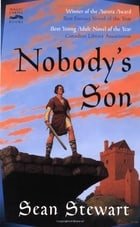 Posted : 17 years, 7 months ago on 15 November 2007 09:44
(A review of Nobody's Son)
Posted : 17 years, 7 months ago on 15 November 2007 09:44
(A review of Nobody's Son)Shielder's Mark was abandoned by his father when he was a boy. In other words, he's Nobody's son. Having dreamt all his childhood of adventure and glory, he decides to go to the Ghostwood to try and break the spell of the Red Keep. And actually manages to.
Bringing back a sword named Sweetnesss as proof, he goes to the King's castle to claim the reward. King Astin asks Mark to give up the legandary blade in exchange for any prize of his choosing. Mark picks the sovereign's most precious jewel: the hand of his youngest daughter, the bold and impetuous Gail, currently betrothed to Duke Richard.
Mark is a farmboy, not used to court manners. He's blunt and makes blunder after blunder, but the Princess actually sees in him her chance at freedom from court duties and etiquette.
And since Gail wants to enjoy the world, she won't let her new husband touch her until she decides so, for fear she falls pregnant and has to stay at home. She'll also make Mark travel on foot to their estate at Borders, in the company of Lissa, her strongheaded childhood pal and lady-in-waiting, and Mark's only friend at court, the elegant and bespectacled Valerian, who's secretly in love with Lissa.
During the treck they'll grow fond of each other.
Arriving at Borders, Mark realises that by breaking the spell, he might have unleashed the magic and ghosts that had been sealed off in the keep. Now he has to put everything right.
Nobody's son isn't your typical fantasy novel. Nor is Gail your typical princess or Mark your typical hero. He swears, has fears and doubts, and we're privy to his thoughts. This gives the book a slightly comical tone and a pleasant rhythm. A nice surprise!
Bringing back a sword named Sweetnesss as proof, he goes to the King's castle to claim the reward. King Astin asks Mark to give up the legandary blade in exchange for any prize of his choosing. Mark picks the sovereign's most precious jewel: the hand of his youngest daughter, the bold and impetuous Gail, currently betrothed to Duke Richard.
Mark is a farmboy, not used to court manners. He's blunt and makes blunder after blunder, but the Princess actually sees in him her chance at freedom from court duties and etiquette.
And since Gail wants to enjoy the world, she won't let her new husband touch her until she decides so, for fear she falls pregnant and has to stay at home. She'll also make Mark travel on foot to their estate at Borders, in the company of Lissa, her strongheaded childhood pal and lady-in-waiting, and Mark's only friend at court, the elegant and bespectacled Valerian, who's secretly in love with Lissa.
During the treck they'll grow fond of each other.
Arriving at Borders, Mark realises that by breaking the spell, he might have unleashed the magic and ghosts that had been sealed off in the keep. Now he has to put everything right.
Nobody's son isn't your typical fantasy novel. Nor is Gail your typical princess or Mark your typical hero. He swears, has fears and doubts, and we're privy to his thoughts. This gives the book a slightly comical tone and a pleasant rhythm. A nice surprise!
 0 comments, Reply to this entry
0 comments, Reply to this entry
Good for culture, but not very exciting.
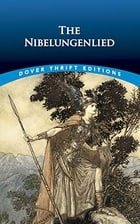 Posted : 17 years, 8 months ago on 30 October 2007 11:22
(A review of The Nibelungenlied (Dover Thrift Editions))
Posted : 17 years, 8 months ago on 30 October 2007 11:22
(A review of The Nibelungenlied (Dover Thrift Editions))The Nibelungenlied is an old Germanic poem composed of two parts.
In the first half we learn about the warrior hero Sifrid, the extremely rich and magically strong Netherlandic prince of the Nibelung and of his quest to win the heart of fair Kriemhilde, princess of Burgundy, King Gunther's sister.
Later, there's a rumour that Brünnhilde of Iceland has set up an impossible challenge where the prize is no less than her hand.
King Gunther travels to Iceland to take up this competition With the help of his friend Hagen of Tronege, among others, and that of Sifrid's special powers. But for this he has to pretend that Sifrid is only his vassal. This will lead to a terrible quiproquo between both brides, many hurt prides, secret plottings, and finally to the death of Sifrid by Hagen of Tronege's hand.
The second half tells us of Kriemhilde's incosolable grief, which will turn into an insatiable hunger for revenge against her brother and Hagen, resulting in total carnage.
Probably misinformed, or also mislead by childhood memories of Saint Seiya (where I first heard of the Ring of the Nibelungen), I was expecting tales of Odin and Ragnarok. The fantasy part is actually rather small, as it only consists of the special powers Sifrid gets from the cloak of invisibility he won from a dwarf called Alberich. The story is a bit repetitive, perhaps because of the stances structure (even though this is the prose translation), and I didn't really care for any of the characters. In the beginning, I was on Kriemhilde's side, but in the end she caused too much death and destruction. As a whole, I will say that this was good for my general literary culture, but not a very exciting read.
In the first half we learn about the warrior hero Sifrid, the extremely rich and magically strong Netherlandic prince of the Nibelung and of his quest to win the heart of fair Kriemhilde, princess of Burgundy, King Gunther's sister.
Later, there's a rumour that Brünnhilde of Iceland has set up an impossible challenge where the prize is no less than her hand.
King Gunther travels to Iceland to take up this competition With the help of his friend Hagen of Tronege, among others, and that of Sifrid's special powers. But for this he has to pretend that Sifrid is only his vassal. This will lead to a terrible quiproquo between both brides, many hurt prides, secret plottings, and finally to the death of Sifrid by Hagen of Tronege's hand.
The second half tells us of Kriemhilde's incosolable grief, which will turn into an insatiable hunger for revenge against her brother and Hagen, resulting in total carnage.
Probably misinformed, or also mislead by childhood memories of Saint Seiya (where I first heard of the Ring of the Nibelungen), I was expecting tales of Odin and Ragnarok. The fantasy part is actually rather small, as it only consists of the special powers Sifrid gets from the cloak of invisibility he won from a dwarf called Alberich. The story is a bit repetitive, perhaps because of the stances structure (even though this is the prose translation), and I didn't really care for any of the characters. In the beginning, I was on Kriemhilde's side, but in the end she caused too much death and destruction. As a whole, I will say that this was good for my general literary culture, but not a very exciting read.
 0 comments, Reply to this entry
0 comments, Reply to this entry
Longish and anticlimactic.
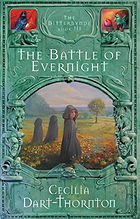 Posted : 17 years, 8 months ago on 30 October 2007 11:14
(A review of The Battle of Evernight: The Bitterbynde - Book, 3 (The Bitterbynde Trilogy))
Posted : 17 years, 8 months ago on 30 October 2007 11:14
(A review of The Battle of Evernight: The Bitterbynde - Book, 3 (The Bitterbynde Trilogy))The Battle of Evernight is the third and final book of the Bitterbynde trilogy (after The Ill-Made Mute and The Lady of the Sorrows).
Now that Tahquil, our heroin-with-too-many-names, has gotten most of her memory back, she's gnawed at by the Langothe, an unendurable longing for the Faêran Realm, in addition to her yearning for her lover Thorn.
Tahquil knows now that she is the only one who can open the magic door to the Fair Realm, left ajar with three strands of her golden hair several hundred years ago. Which is why she is sought after by Angavar and hunted down by Morragan and his hordes of unseelie creatures: the Faêran King and his twin brother and nemesis, the Raven Prince are trapped in Erith.
In the company of her maids Caitri and Viviana, she sets out on a journey to Arcdur, to find the Gate of Oblivion's Kiss. Starting near Huntingtowers, together they'll travel all across Eldaraigne, successively through: the flowery Arven Meadows, the jungle of Khazathdaur and its tree-top catwalks, the river-ridden hills of Lallillir, the orchards of Cinnarine, then changing their course to go to Morragan's lair, through the labyrinthine hedges of Firzenholt, the wasteland, and the volcanic desolation of Tapthartharath, making friends with helpful wights along the way: an Urisk, a Waterhorse and a Swanmaiden.
Does this description sound like a tedious enumeration to you? Well, it actually echoes what reading the story felt like to me. Although the vocabulary used in this volume is less intricate, the book is mostly longish and uneventful. Even the long-expected clash between good and evil falls flat, anticlimactic. Still, there are a couple of passages I enjoyed: a moment of respite when the girls make a halt in Appleton Thorn, enjoying the villagers' traditions and rites, and the unexpected fifteen-or-so last pages.
Now that Tahquil, our heroin-with-too-many-names, has gotten most of her memory back, she's gnawed at by the Langothe, an unendurable longing for the Faêran Realm, in addition to her yearning for her lover Thorn.
Tahquil knows now that she is the only one who can open the magic door to the Fair Realm, left ajar with three strands of her golden hair several hundred years ago. Which is why she is sought after by Angavar and hunted down by Morragan and his hordes of unseelie creatures: the Faêran King and his twin brother and nemesis, the Raven Prince are trapped in Erith.
In the company of her maids Caitri and Viviana, she sets out on a journey to Arcdur, to find the Gate of Oblivion's Kiss. Starting near Huntingtowers, together they'll travel all across Eldaraigne, successively through: the flowery Arven Meadows, the jungle of Khazathdaur and its tree-top catwalks, the river-ridden hills of Lallillir, the orchards of Cinnarine, then changing their course to go to Morragan's lair, through the labyrinthine hedges of Firzenholt, the wasteland, and the volcanic desolation of Tapthartharath, making friends with helpful wights along the way: an Urisk, a Waterhorse and a Swanmaiden.
Does this description sound like a tedious enumeration to you? Well, it actually echoes what reading the story felt like to me. Although the vocabulary used in this volume is less intricate, the book is mostly longish and uneventful. Even the long-expected clash between good and evil falls flat, anticlimactic. Still, there are a couple of passages I enjoyed: a moment of respite when the girls make a halt in Appleton Thorn, enjoying the villagers' traditions and rites, and the unexpected fifteen-or-so last pages.
 0 comments, Reply to this entry
0 comments, Reply to this entry
 Login
Login
 Home
Home 7 Lists
7 Lists 198 Reviews
198 Reviews Collections
Collections